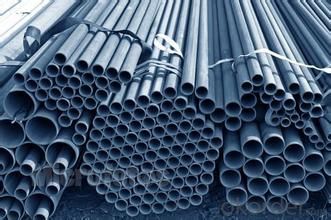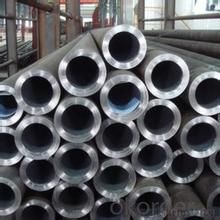Packaging & Delivery
| Packaging Details: | BUNDLE,PLASTIC BAG, HEXAGONAL METAL STRAPS, WOODEN CASE ,WOVEN BAG |
|---|---|
| Delivery Detail: | 15-30days |
OKorder Service Pledge
OKorder Financial Service
You Might Also Like
Grade:A53-A369
Thickness:8 mm
Place of Origin:Tianjin, China (Mainland)
Secondary Or Not:Is Secondary
Technique:Seamless
Model Number:273mm*8mm
Standard:ASME, ASTM A106-2006
Specification:273mm*8mm
Outer Diameter:273mm
Length:5-12Meters
Usage:used in home application
Grade:API J55
| Packaging Details: | BUNDLE,PLASTIC BAG, HEXAGONAL METAL STRAPS, WOODEN CASE ,WOVEN BAG |
|---|---|
| Delivery Detail: | 15-30days |
SS steel tube 316L
273mm*8mm
5-12Meters
used in home application, construction and other purposes.
SS steel tube 316L
273mm*8mm
5-12Meters
used in home application, construction and other purposes
API SPEC 5CT J55\K55\N80\L80\P110(LTC),(STC),(BTC)
API SPEC 5L
PSL 1:A25\A\B\X42\X46\X52\X56\X60\ X65 \X70
PSL 2:B\X42\X46\X52\X56\X60\X65\X70\ X80
ASTM A106 GR.A\B\C
ASTM A53 GR.A\B
DIN1629
JIS G3454
ASTM A192\A210\A179
DIN17175
JIS G3455
ASTM A213
JIS G3456
APPLICATION: | |||||||||||
API SPEC 5L For the purpose of transportation of gas,water,oill in oil&gas industry. | |||||||||||
API SPEC 5CT.Tubing is used in extracting petroleum & natural gas. casing pipe serves as wall of well. | |||||||||||
ASTM A106. for the purpose of the pipeline project of boiler,water&petroleum. | |||||||||||
ASTM A53 It is used for conveying water,petrolem,gas and other common fluids. | |||||||||||
ASTM A179 For tubed heat exchanger and similar heat conveying equipments | |||||||||||
ASTM A192 For manufacture wall panel,economizer,reheater,superheater and steam pipeline of boilers. | |||||||||||
Chemical Composition | |||||||||||
STANDARD | GRADE | CHEMICAL COMPOSITION | |||||||||
C | Si | Mn | P | S | Cr | Mo | Cu | Ni | V | ||
ASME SA106 | SA106B | 0.170.25 | ≥0.1 | 0.701.00 | ≤0.030 | ≤0.030 | ≤0.035 | ||||
ASTM A106 | A | ≤0.25 | ≤0.10 | 0.270.93 | ≤0.035 | ≤0.035 | ≤0.40 | ≤0.15 | ≤0.40 | ≤0.40 | ≤0.08 |
B | ≤0.30 | ≤0.10 | 0.291.06 | ≤0.035 | ≤0.035 | ≤0.40 | ≤0.15 | ≤0.40 | ≤0.40 | ≤0.08 | |
C | ≤0.35 | ≤0.10 | 0.291.06 | ≤0.035 | ≤0.035 | ≤0.40 | ≤0.15 | ≤0.40 | ≤0.40 | ≤0.08 | |
ASTM A53 | A | 0.25 | / | 0.95 | 0.05 | 0.045 | 0.40 | 0.15 | 0.40 | 0.40 | 0.08 |
B | 0.3 | / | 1.2 | 0.05 | 0.045 | 0.40 | 0.15 | 0.40 | 0.40 | 0.08 | |
ASTM A179 | A179 | ≤0.06-0.18 | / | 0.27-0.63 | ≤0.035 | ≤0.035 | |||||
ASTM A192 | A192 | 0.060.18 | ≤0.25 | 0.270.63 | ≤0.035 | ≤0.035 | |||||
ASTM A210 | A-1 | ≤0.27 | ≥0.10 | ≤0.93 | ≤0.035 | ≤0.035 | |||||
C | ≤0.35 | ≥0.10 | 0.291.06 | ≤0.035 | ≤0.035 | ||||||
FAQ of Alloy Steel Pipe :
①How is the quality of your products?
Our products are manufactured strictly according to national and internaional standard, and we take a test
on every pipe before delivered out. If you want see our quality certifications and all kinds of testing report, please just ask us for it.
Guaranteed: If products’ quality don’t accord to discription as we give or the promise before you place order, we promise 100% refund.
②How about price?
Yes, we are factory and be able to give you lowest price below market one, and we have a policy that “ for saving time and absolutely honest business attitude, we quote as lowest as possible for any customer, and discount can be given according to quantity”,if you like bargain and factory price is not low enough as you think, just don’t waste your time.Please trust the quotation we would give you, it is professional one.
③Why should you chose us?
Chose happens because of quality, then price, We can give you both.Additionally, we can also offer professional products inquiry, products knowledge train(for agents), smooth goods delivery, exellent customer solution proposals.Our service formula: good quality+good price+good service=customer’s trust
SGS test is available, customer inspection before shipping is welcome, third party inspection is no problem.
Any question, pls feel free to contact us !


Send your message to us
OKorder Service Pledge
OKorder Financial Service
Similar products
Hot products
Hot Searches
Related keywords